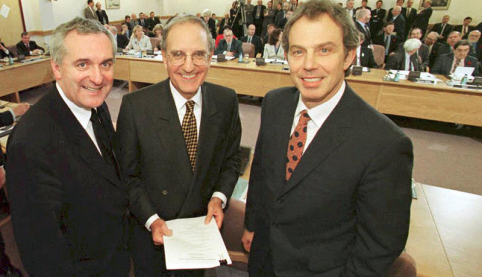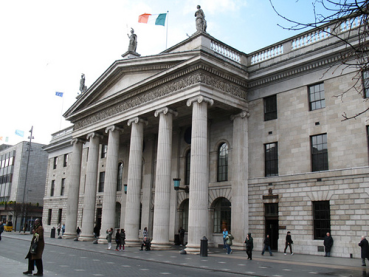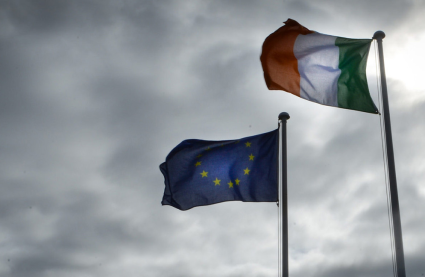👉 Find out about The Open University's History courses. 👈
Reflections on the Good Friday Agreement
© The Open University and its licensors. 'Reflections on the Good Friday Agreement' is not available under a Creative Commons license, unless otherwise stated.
This video gathers reflections from many of the key negotiators involved in the making of the Good Friday Agreement and those opposed to it. Contributors consider their memories of people, places and processes and the impact of this political development in the lives of citizens in Northern Ireland and beyond.
You can also read an article about the campaign for a ‘yes’ vote in favour of the Good Friday Agreement:
-

How the Good Friday Agreement changed my life...
Read now to access more details of How the Good Friday Agreement changed my life...Quintin Oliver, who ran the non-party and cross-party YES Campaign in the 1998 Referendum, discusses how The Good Friday Agreement changed his life.
Article
Level: 1 Introductory
About the video:
We are grateful to the following individuals who gave their time to contribute to the video (click on the individual to find out more about them):
Mr Bertie Ahern
Bertie Ahern was first elected to the Dáil (Parliament) in 1977 he was Minister for Labour from March 1987 to November 1991 and was appointed Minister for Finance on three separate occasions from November 1991 to December 1994. He has served as Tánaiste (Deputy Prime Minister), Minister for Arts, Culture & the Gaeltacht and Minister for Industry and Commerce at various stages. His first ministerial appointment was as Government Chief Whip and Minister of State at the Department of the Taoiseach and at the Department for Defense in 1982. Bertie Ahern was a member of Dublin City Council from 1978 to 1988 and had the honor of serving as Lord Mayor of Dublin from 1986 to 1987. In November 1994 he was elected leader of his party Fianna Fáil and served as Leader of the Opposition from then until June 1997. He was first elected Taoiseach (Prime Minister) in June 1997, he was re-elected in June 2002 and again in May 2007.
In 1997 Bertie Ahern received widespread praise for his political skills in ensuring that this administration served it full five year term and delivered on real political and economic progress for the Irish people. The defining moment of this period and a defining moment in Irish history was the successful negotiation by Bertie Ahern and Tony Blair of the Good Friday Agreement between the British and Irish Governments and the political parties in Northern Ireland in April 1998.He was re-elected Taoiseach (Prime Minister) in June 2002. These years were a period of unprecedented economic growth and social change in Ireland. It was also a period of continuing and intense engagement with the Northern Ireland peace process. On 8th May 2007 those years of work paid a rich dividend when a power sharing Administration was established in Northern Ireland. After nine years of unstinting political commitment this historic event represented the full implementation of the Good Friday Agreement and a great triumph for Mr Ahern, Mr Blair and the leaders of the Northern Ireland parties. On 14 June, 2007, following a general election which saw his party, Fianna Fáil, returned to power Mr Ahern was elected as Taoiseach (Prime Minister) for the third time.
Professor, the Lord Alderdice FRCPsych
As Leader of the Alliance Party of Northern Ireland, Lord Alderdice played a significant role in the negotiation of the 1998 Good Friday Agreement. He was the first Speaker of the new Northern Ireland Assembly until 2004 when he was appointed to the Independent Monitoring Commission tasked by the British and Irish Governments with security normalisation and closing down terrorist activity in Northern Ireland. He was also President of Liberal International, the global federation of more than 100 liberal political parties (now Presidente D’Honneur), Chairman of the Liberal Democrat Party in the House of Lords, and a consultant psychiatrist and Senior Lecturer at The Queen’s University of Belfast. He is currently Director of the Centre for the Resolution of Intractable Conflict at Harris Manchester College (Oxford), Chairman of the Centre for Democracy and Peace Building (Belfast) and a Clinical Professor in the Department of Psychiatry at the University of Maryland in Baltimore (USA).
Lord Alderdice has received a numbers of award and honorary degrees including one from The Open University, presented in Belfast in 2014.
Mr Gerry Kelly MLA
Gerry Kelly was born in Belfast in 1953. He was reared in a family of eleven children.
Gerry has been an Irish republican activist all his adult life. After joining the IRA he was imprisoned on a number of occasions, escaping twice.
On his release in 1989 he joined Sinn Féin and became part of their negotiating team leading up to the Good Friday Agreement.
Elected for the first time in 1996 he became an MLA in 1998. He has been in MLA since and between 2007 and 2011 was a Junior Minister. He is now Sinn Féin's policing spokesperson and has been a member of the Policing Board.
Gerry is also the author of ‘The Escape: The inside story of the 1983 escape from Long Kesh prison’ which was released in 2013.
Mr Seamus Mallon
Seamus Mallon is an Irish politician. Formerly a teacher, he became the first deputy First Minister of Northern Ireland from 1998 to 2001. He was also the Deputy Leader of the Social Democratic and Labour Party from 1979 to 2001. He was MP for Newry and Armagh from 1986-2005 and MLA for the same constituency from 1998-2003. He was a member of Seanad Éireann in 1982, having been nominated by the Taoiseach.
Senator George J. Mitchell
George Mitchell served as US Special Envoy for Middle East Peace from January 2009 to May 2011.
Prior to that he had a distinguished career in public service. He was appointed to the United States Senate in 1980 to complete the unexpired term of Senator Edmund S. Muskie, who resigned to become Secretary of State. He was elected to a full term in the Senate in 1982 in a stunning come-from-behind victory. After trailing in public opinion polls by 36 points, Senator Mitchell rallied to win the election, receiving 61 percent of the votes cast. Senator Mitchell went on to an illustrious career in the Senate spanning 15 years.
In 1988, he was reelected with 81 percent of the vote, the largest margin in Maine history. He left the Senate in 1995 as the Senate majority leader, a position he had held since January 1989.
Senator Mitchell enjoyed bipartisan respect during his tenure. It has been said "there is not a man, woman or child in the Capitol who does not trust George Mitchell." For six consecutive years he was voted "the most respected member" of the Senate by a bipartisan group of senior congressional aides.
While in the Senate, Senator Mitchell served on the Finance, Veterans Affairs, and Environment and Public Works Committees. He led the successful 1990 reauthorization of the Clean Air Act, including new controls on acid rain toxins. He was the author of the first national oil spill prevention and cleanup law. Senator Mitchell led the Senate to passage of the nation's first child care bill and was principal author of the low-income housing tax credit program. He was instrumental in the passage of the Americans with Disabilities Act, landmark legislation extending civil rights protections to the disabled. Senator Mitchell's efforts led to the passage of a higher education bill that expanded opportunities for millions of Americans. He was a leader in opening markets to trade and led the Senate to ratification of the North American Free Trade Agreement and creation of the World Trade Organization.
Senator Mitchell received an undergraduate degree from Bowdoin College and a law degree from the Georgetown University Law Center. He served in Berlin, Germany, as an officer in the US Army Counter-Intelligence Corps from 1954 to 1956. From 1960 to 1962 he was a trial lawyer in the Justice Department in Washington, DC. From 1962 to 1965 he served as executive assistant to Senator Edmund S. Muskie. In 1965 he returned to Maine where he engaged in the private practice of law in Portland until 1977. He was then appointed US attorney for Maine, a position he held until 1979, when he was appointed US District Judge for Maine. He resigned that position in 1980 to accept appointment to the US Senate.
In 1995, he served as a Special Advisor to President William J. Clinton on Ireland, and from 1996 to 2000 he served as the Independent Chairman of the Northern Ireland Peace Talks. Under his leadership, the Good Friday Agreement, an historic accord ending decades of conflict, was agreed to by the governments of Ireland and the United Kingdom and the political parties of Northern Ireland. For his service in Northern Ireland Senator Mitchell received numerous awards and honors, including the Presidential Medal of Freedom, the highest civilian honor given by the US government; the Philadelphia Liberty Medal; the Truman Institute Peace Prize; and the United Nations (UNESCO) Peace Prize.
In 2000 and 2001, at the request of President Clinton, Prime Minister Ehud Barak, and Chairman Yasser Arafat, Senator Mitchell served as Chairman of an International Fact-Finding Committee on violence in the Middle East. The Committee's recommendation, widely known as The Mitchell Report, was endorsed by the Bush Administration, the European Union and by many other governments.
In 2006 and 2007 he led the investigation into the use of performance-enhancing drugs in Major League Baseball. He also served as Chairman of the Special Commission Investigating Allegations of Impropriety in the Bidding Process for the Olympic Games and was the Independent Overseer of the American Red Cross Liberty Fund, which provided relief for September 11 attack victims and their families.
Senator Mitchell served as Chairman of the global board of the law firm DLA Piper; Chairman of the board of directors of The Walt Disney Company; a member of the board of the Boston Red Sox; and a director of several companies, including Federal Express, Xerox, Staples, Unilever and Starwood Hotels and Resorts. He also served for ten years as the Chancellor of Queen’s University of Northern Ireland; as President of the Economic Club of Washington; and as Chairman of the International Crisis Group.
Professor Monica McWilliams
Monica McWilliams was a signatory to the 1998 Good Friday Agreement and a delegate to the multi-party peace talks in Northern Ireland from 1996 to 1998. She was elected to the first Northern Ireland Assembly from 1998-2003 where she served on the health, education and employment committees. She was the co-founder and leader of the Northern Ireland Women’s Coalition political party and represented South Belfast as a Member of the Legislative Assembly. At the request of the British and Irish governments, she acted as Chairperson of the peace agreement’s implementation committee on human rights. Monica was appointed to the Northern Ireland Human Rights Commission from 2005 to 2011 where, as Chief Commissioner, she led the discussions with civil society groups and political parties in drafting the advice on a Bill of Rights as mandated by the peace agreement. Monica is Emeritus Professor in the Transitional Justice Institute at Ulster University and is currently a member of the International Independent Reporting Commission for the disbandment of paramilitary organisations. She has published widely on the issues of human rights, peace and security and completed a large-scale study on the impact of political settlements on violence against women. Monica is the recipient of the JF Kennedy Profile in Courage award and several honorary doctorates.
Mr Jonathan Powell
Jonathan Powell is an expert on conflict resolution and negotiation strategy with 35 years’ experience. He is Director of Inter Mediate, the NGO he established in 2011.
Jonathan was Tony Blair’s chief of staff from 1995 to 2007. He was the only senior adviser to stay with Blair from his election as leader of the Labour Party until he left No 10 Downing Street.
Prior to working for Tony Blair, Jonathan was a British diplomat from 1979 to 1994, working on the negotiations with the Chinese on the return of Hong Kong in the early 1980s, the CSCE negotiations with the former Soviet Union and the CDE arms control talks in the mid-1980s and the 2 plus 4 negotiations on German unification in the late 1980s.
Jonathan was the political officer in the British Embassy in Washington from 1991 to 1994 and attached himself to Bill Clinton’s Presidential campaign in 1991 and predicted his victory. He introduced Tony Blair to Bill Clinton and his team after his victory in 1993.
While in Downing Street Jonathan was also the chief British negotiator on Northern Ireland from 1997 to 2007. He helped lead the talks to a successful conclusion ending centuries of conflict on the island of Ireland.
From 2006 to 2011 Jonathan worked on the negotiations between the Spanish government and ETA, the Basque terrorist group, which ended the fifty year armed conflict with the Aiete declaration in San Sebastián in 2011.
In 2011 Jonathan established the not-for-profit Inter Mediate to work on armed conflicts around the world. Inter Mediate has served as advisers to President Santos in Colombia on the negotiations with the FARC since 2011. Those negotiations successfully concluded with a peace agreement that ended 50 years of conflict which caused nearly 250,000 deaths.
Jonathan was appointed Prime Minister David Cameron’s special envoy for Libya from April 2014 – July 2016.
Inter Mediate are also advising Aung San Suu Kyi in Burma on the peace negotiations there with the Tatmadaw (Burmese army) and seventeen ethnic armed groups who have been at war for sixty years. Inter Mediate operates discreetly and deniably with nine other projects in Africa, Asia, Latin America and the Middle East. Its work is funded by neutral governments.
On leaving No 10 Downing Street Jonathan became a Managing Director at Morgan Stanley from 2008-9.
Jonathan is a member of the board of Save the Children International.
Jonathan has published three books: ‘Great Hatred, Little Room: Making Peace in Northern Ireland’, ‘The New Machiavelli, How to Wield Power in the Modern World’, and ‘Talking to Terrorists, How to End Armed Conflict’.
The Rt. Hon. (William) David Trimble, Lord Trimble
David Trimble was Member of Parliament, Upper Bann from 1990 to 2005 and Leader of the Ulster Unionist Party, 1995 to 2005. He served as First Minister of Northern Ireland from 1998 to 2002 and became Member of the Northern Ireland Assembly from 1998 to 2007. In 2006, David was created Lord Trimble of Lisnagarvey, 2006, sitting in the House of Lords as a Crossbench peer 2006, then as a Conservative Peer 2007 to date.
He won the Nobel Peace Laureate 1998 (jointly with John Hume), following the making of the Belfast Agreement on 10 April 1998 (Good Friday).
Formerly, David was a Lecturer and Senior Lecturer in Law at Queen’s University Belfast and Member (South Belfast) of Northern Ireland Constitutional Convention.
David Trimble was born 15 October 1944. He married Daphne in 1978 and has two sons and two daughters.
Mr Sammy Wilson MP
Sammy Wilson began his life in politics as the Democratic Unionist Party’s Press Officer and in 1981 he was elected as a DUP Councillor to Belfast City Council where he served as Mayor on two separate occasions.
Sammy was elected to the Northern Ireland Assembly upon its creation in June 1998 and again in 2003. In June 2008 Sammy became Minister for the Department of the Environment and in June 2009, after an Executive reshuffle, Sammy became Minister for Finance and Personnel.
Sammy became a Member of Parliament in 2005 when he was successful in the Parliamentary elections with 49.6% of the vote in the East Antrim constituency.
Sammy campaigned vigorously for the United Kingdom to leave the EU and believes that the UK would be better served being in charge of its own finances, trade and immigration laws. He serves on the Brexit Committee at Westminster.
This article is part of The Good Friday Agreement Collection
-

The Good Friday Agreement: 25 Years On
Learn more to access more details of The Good Friday Agreement: 25 Years OnA Peace Of Us is a podcast series featuring voices beyond the political institutions exploring the impact the Good Friday Agreement had on the arts, sports, communities and the lives of people in Northern Ireland. Alongside this podcast, you will find a series of guest essays, local music, art and more.
Collection
Learn more about The Good Friday Agreement and Irish history:
-

A Peace of Us - The Good Friday Agreement Podcast
Read now to access more details of A Peace of Us - The Good Friday Agreement PodcastThis Open University podcast discusses the ways in which The Good Friday Agreement changed our communities, arts, sports, and lives.
-

What was the Easter Rising?
Watch now to access more details of What was the Easter Rising?How close did the Easter Rising come to achieving the aims of its leaders?
-

Brexit and the Irish border
Read now to access more details of Brexit and the Irish borderHow are Brexit and the Irish border connected? Dr Philp O'Sullivan reflects on the changing geographical relationship between the UK and Ireland.
-

The suicide of The Ceasefire Babies
Read now to access more details of The suicide of The Ceasefire BabiesIn Northern Ireland, more people took their own lives in the 16 years after the Troubles than died during them. Why? Lyra McKee finds out.

Rate and Review
Rate this article
Review this article
Log into OpenLearn to leave reviews and join in the conversation.
Article reviews